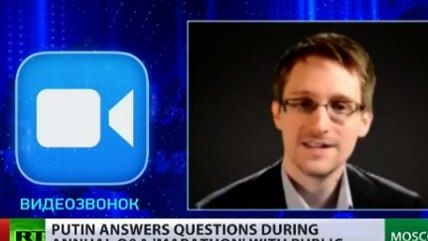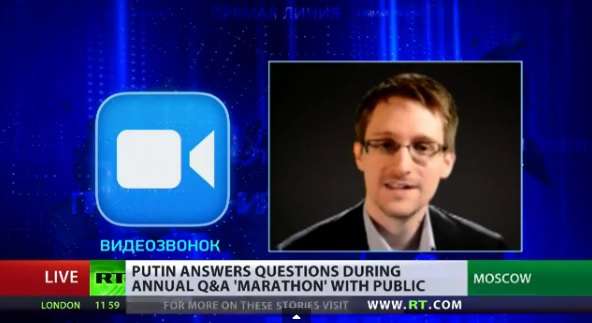Snowden Defends Question to Putin, Notes Russian President's Evasiveness


Earlier in the week, Edward Snowden popped up on Russian television asking President Vladimir Putin if the country engages in mass surveillance of the communications of Russian citizens. Putin, of course, denied it. Matthew Feeney wrote about the exchange yesterday, along with responses from folks who worry it's a sign Snowden is under the influence of the Russian government or perhaps having to play ball to protect his amnesty there.
Today, The Guardian published Snowden's response to those who were critical of his appearance. He notes that Putin's responses did appear evasive and would hardly put the matter to rest in Russia:
There are serious inconsistencies in his denial—and we'll get to them soon—but it was not the president's suspiciously narrow answer that was criticized by many pundits. It was that I had chosen to ask a question at all.
I was surprised that people who witnessed me risk my life to expose the surveillance practices of my own country could not believe that I might also criticize the surveillance policies of Russia, a country to which I have sworn no allegiance, without ulterior motive. I regret that my question could be misinterpreted, and that it enabled many to ignore the substance of the question – and Putin's evasive response – in order to speculate, wildly and incorrectly, about my motives for asking it.
The investigative journalist Andrei Soldatov, perhaps the single most prominent critic of Russia's surveillance apparatus (and someone who has repeatedly criticised me in the past year), described my question as "extremely important for Russia". According to the Daily Beast, Soldatov said it could lift a de facto ban on public conversations about state eavesdropping.
Others have pointed out that Putin's response appears to be the strongest denial of involvement in mass surveillance ever given by a Russian leader—a denial that is, generously speaking, likely to be revisited by journalists.
Snowden goes on to point out the surveillance system put in place to monitor all communications at the Sochi Olympics. It seems as though Snowden is hoping to use Putin's obvious desire to embarrass the United States to push for Russia to be more transparent as well. But given that Russia treats its protesters and dissidents significantly differently (as in, much, much worse) than America, it may be a little much to expect anything resembling the open debates we're having here.


Show Comments (25)